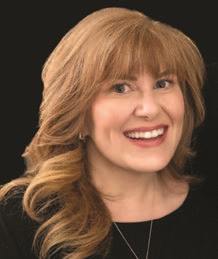Uniting in Understanding: The Role of Peer Support in ADHD Management
Suzanne Sophos, CMPSS
Download PDF
When my son was diagnosed with ADHD, it felt like I was navigating a maze without a map. In some ways, his diagnosis at the age of four brought a sense of relief. His struggles finally had a name. More than anything, his diagnosis led me to many more questions than answers. He was struggling. I was struggling. Our whole family was struggling. The sense of isolation I felt was overwhelming. At the time, I assumed I didn’t know anyone with ADHD—or anyone who knew anything about ADHD.
 I found myself searching online for resources late into the night, attempting to educate myself about ADHD treatment options and outcomes. I was stuck, aching for something to give me a sense of purpose and direction about our path forward. When my searches led me to Children and Adults with ADHD (CHADD), I felt a sense of hope. CHADD’s evidence-based approach to ADHD education resonated with me and their hotline, staffed with health information specialists, led me to better understand what we were dealing with.
I found myself searching online for resources late into the night, attempting to educate myself about ADHD treatment options and outcomes. I was stuck, aching for something to give me a sense of purpose and direction about our path forward. When my searches led me to Children and Adults with ADHD (CHADD), I felt a sense of hope. CHADD’s evidence-based approach to ADHD education resonated with me and their hotline, staffed with health information specialists, led me to better understand what we were dealing with.
Becoming a member of CHADD changed the trajectory of our family’s ADHD journey. Shortly after joining, my local chapter coordinator reached out to welcome me and invited me to a parent support group. The experiences I heard about in those meetings echoed my own, instantly making me feel less alone. I learned about parenting techniques, local resources, and I was mentored through the process of building a care team for my son. Over time, my son’s challenges became so much more manageable.
Oddly enough, I still found myself struggling. I began to realize that many of my lifelong challenges–self-regulation, addiction issues, impulsivity, and executive function—mirrored those of ADHD. Within a year of my son’s diagnosis, I was also officially diagnosed. It’s a story clinicians hear regularly. The latest data shows that about twenty-five percent of parents of children with ADHD will also have the condition.
Thanks to two decades of participation in Alcoholics Anonymous and now CHADD’s parent support groups, I understand the profound impact peer support has when one is coping with life’s challenges. I determined that, along with therapy and medication, peer support would be my way forward to managing my ADHD.
I worked with fellow ADHD brains, author and ADHD advocate Jessica McCabe and executive function coach Yulia Rafailova, to start a CHADD support group for adults in the Los Angeles area. We call ourselves the ADHD Empowerment Community, and for the past six years, this weekly group has been my anchor and my guide.
In the span of a few years, our community has grown from six people to about three thousand members from across the United States, meeting virtually and in person. Having more members has led to more volunteers. Thanks to those volunteers, we’ve been able to add peer support groups for adults with ADHD who are in recovery from addiction and teen women with ADHD. We’ve also implemented peer-based programs like coworking/body doubling, meditation, and journaling. Peer support empowers the individuals in our community to live better, whether they’re adults living with ADHD or caregivers to a child with ADHD.
My journey through ADHD and peer support has taught me the undeniable truth: together, we are stronger.
The history of peer support in ADHD management
 While the concept of peer support isn’t new, its application as a part of ADHD treatment among adults and parents of ADHD children is a fresh source of hope for living better. The concept of organized peer support in the United States owes much to the mental health consumer movement of the 1970s. This movement empowered individuals with experience in mental health services to assist each other and advocate for their rights.
While the concept of peer support isn’t new, its application as a part of ADHD treatment among adults and parents of ADHD children is a fresh source of hope for living better. The concept of organized peer support in the United States owes much to the mental health consumer movement of the 1970s. This movement empowered individuals with experience in mental health services to assist each other and advocate for their rights.
In the 1990s, peer support was formally introduced as a service in community mental healthcare. More recently, in 2008 and 2010 respectively, the Mental Health Parity and Addiction Equity Act (MHPAEA) and the Affordable Care Act (ACA) further legitimized the therapeutic, evidence-based effects of peer support. Finally, in 2022, recognizing the power of peer support for a stressed mental health care system, the Biden-Harris Administration implemented a national peer support specialist certification program to accelerate the universal adoption, recognition, and integration of the peer mental health workforce across all elements of the US healthcare system.
Since its inception, peer support has expanded into various domains, including chronic disease management (diabetes, mental health conditions, heart disease, cancer, asthma, HIV/AIDS, and substance abuse), screening and prevention methods for conditions like cancer, HIV/AIDS, and infectious diseases, as well as maternal and child health initiatives (breastfeeding, nutrition, and postpartum depression).
Today, peer support has gained mainstream recognition and acceptance. Thanks to organizations like CHADD and the Attention Deficit Disorder Association (ADDA), peer support for ADHD is more accessible than ever.
For those of us navigating the complexities of ADHD, whether personally or as caregivers, the principles of peer support offer a roadmap to understanding, acceptance, and growth. Peer support groups provide a platform where our stories and struggles are not only heard but deeply understood. They offer a unique blend of empathy, practical advice, and emotional solidarity that traditional medical models cannot replicate. They aren’t just about managing symptoms, but about rebuilding lives with confidence, understanding, and mutual respect.
The role of peer support for ADHD
As we delve deeper into the benefits and mechanics of peer support for ADHD, it’s essential to recognize that this approach is not a replacement for professional medical treatment. Instead, it complements traditional treatments, filling the significant gaps that medication and therapy alone cannot address. Peer support injects a community element into ADHD management, reminding us that beyond the challenges, there are others ready to uplift and support us at every step.
Complementing medical treatment with peer support
While medication and therapy are cornerstone treatments for ADHD, integrating peer support offers a holistic approach that addresses not just the symptoms, but the emotional and social challenges that come with ADHD. Peer support groups often provide practical insights into managing everyday challenges, complementing the clinical advice from medical professionals. This combination is a more comprehensive way of managing ADHD than medical treatment alone, leading to improved treatment outcomes and a greater sense of well-being.
The role of accountability in ADHD management
One of the most profound aspects of peer support for ADHD is the creation of a natural accountability structure, which is key to helping individuals support their executive function challenges and treatment compliance. Members encourage one another to stay committed to their treatment plans, be it through medication adherence, attendance at therapy sessions, or the implementation of organizational systems designed to mitigate the impact of ADHD on daily life. This support system becomes a powerful motivator, as individuals are not only accountable to themselves but also to the group.
Practical benefits of peer support
The benefits of peer support for the treatment of ADHD go well beyond accountability and executive function support. They include:
- Understanding and acceptance. In ADHD peer groups, individuals find unconditional acceptance and understanding of their unique neurodivergence, fostering self-acceptance and a positive self-image in the context of ADHD. For some, peer support meetings with their neurodivergent peers are the first—or only—place individuals feel safe unmasking. Masking refers to hiding ADHD symptoms by modifying behavior and mannerisms, often in ways that don’t come naturally and can be emotionally exhausting.
- Alleviating isolation: Sharing experiences with peers who understand the nuances of ADHD diminishes feelings of isolation commonly experienced by individuals with ADHD, creating a sense of belonging within the community.
- Empowerment through shared experience. Connecting with peers who navigate similar ADHD-related challenges provides empowerment and validation, reducing feelings of isolation and stigma associated with ADHD.
- Tailored strategies and coping mechanisms. Peers in ADHD support networks offer practical advice and coping strategies based on their own experiences with managing ADHD symptoms, aiding in the navigation of daily challenges and symptom management.
- Specialized social support. Engaging in ADHD peer support networks expands social support specifically targeted to the unique needs of individuals with ADHD, providing access to empathetic peers who understand the intricacies of living with ADHD.
- Improved treatment adherence and outcomes. Participation and accountability in ADHD peer support programs can contribute to improved treatment adherence and outcomes. Peers provide encouragement, accountability, and practical strategies for adhering to treatment plans, leading to more positive outcomes in managing ADHD symptoms and overall well-being.
Within our community, we’ve seen remarkable transformations as individuals gain not just the knowledge and tools to manage their ADHD, but also the confidence and support to implement and stick to these strategies. It’s a testament to the fact that while ADHD is a personal journey, it doesn’t have to be a solitary one.
![]()
Peer support groups often provide practical insights into managing everyday challenges, complementing the clinical advice from medical professionals.![]()
A guide to getting involved with peer support
Discovering the right peer support group can be a turning point in managing ADHD for adults and parents of children with ADHD. Organizations like CHADD and ADDA offer a wealth of resources and community support options to empower individuals and families navigating ADHD.
Here’s how you can get involved and tap into the transformative power of peer support.
Joining CHADD and ADDA
- CHADD | chadd.org
CHADD chapters offer a range of support groups for adults with ADHD and families with children affected by ADHD. They provide valuable resources including, evidence-based ADHD education, peer support meetings, and advocacy initiatives. CHADD chapters located throughout the country offer in-person and virtual peer support groups that cater to specific populations within the ADHD community including adults with ADHD, teens with ADHD, parents of children with ADHD, and adults with ADHD who are also in recovery. You can start by visiting CHADD’s website and using their chapter locator to find a local group in your area. Many CHADD chapters can also be found on Meetup. - ADDA | add.org
ADDA is an organization run by adults with ADHD for adults with ADHD. Their efforts are focused on supporting adults through their virtual support groups and online resources designed to empower adults to manage ADHD-related challenges. ADDA has a wide variety of specific ADHD groups for women, young adults, couples, queer women, nonbinary persons, persons aged 50+, Asians, and South Asians, among others.
Exploring niche groups
- Focused Femmes on Facebook | https://www.facebook.com/groups/211160820303333
This group offers a space for women with ADHD to share their experiences, challenges, and successes. It’s a supportive community where you can find tips, advice, and encouragement from women who understand what it’s like to navigate life with ADHD. - Men’s ADHD Support Group | mensadhdsupportgroup.org
Catering specifically to men with ADHD, this group provides an opportunity to discuss the unique challenges faced by men with ADHD, sharing strategies, insights, and support in a welcoming environment. - CHADD’s ADHD Parents Together | healthunlocked.com/adhd-parents
This online group of 23,000 members provides a safe place to discuss the impact of ADHD on both parents and their children. It’s a supportive community where parents meet to share their experiences, challenges, and wins.
Creating a group
Can’t find a group that fits your specific needs? Connect with your local CHADD chapter or ADDA to see if you can start one, or venture out on your own and create the group you want to be a part of. Perhaps you’d feel most comfortable in a group for senior citizens with ADHD, one for ADHD and eating disorders, or one that brings together people with ADHD who work in the same industry. Platforms like Facebook, Meetup, and Discord make it easy to find and connect with your peers.
Starting your peer support journey
The journey from feeling isolated to being empowered alongside others with ADHD can be transformative. Peer support isn’t just about receiving help; it’s about building a community where everyone contributes, learns, and grows together.
Reach out. Once you’ve identified a group that resonates with you, take the step to reach out. Whether it’s attending a meeting, joining a virtual session, or simply introducing yourself in an online forum, your first step is your entry into a supportive community.
Listen and learn. Most support groups understand that jumping right in isn’t for everyone. Seek out groups that allow you to participate at your own pace. So much can be gained by visiting a group and just listening until you feel ready to contribute.
Engage. Active participation is key to benefiting from peer support. Share your experiences, ask questions, and offer your insights. The more you engage, the more you’ll gain from the community.
Contribute. Over time, you’ll find opportunities to contribute to the community, whether through leading discussions, sharing resources, or offering support to newcomers.
Success Stories: The Effect of Integrated Support
The power of combining traditional treatments with peer support is best illustrated through the kind of success stories we hear from within the ADHD community. Many individuals find that while medication helps manage ADHD symptoms, the strategies, understanding, and encouragement from peer groups empower them to navigate life more effectively and confidently. These stories are from members of my community.
“Chatting with other parents in the group, especially those with older kids, has been a lifeline for me. I’ve got twin girls, both eight, and both with high-needs ADHD. It’s one thing to read about ADHD, but it’s another to hear from parents who’ve been in the trenches and come out the other side. They’ve helped me sort out what’s just typical kid stuff and what’s more about ADHD. It’s like they gave me a roadmap for what’s ahead with my daughters, and suddenly, I’m not as anxious about the future. I feel more prepared, more understanding, and honestly, a lot less alone in all this.” —Lauren C.
“Joining the peer support group was a game-changer for me. As someone who’s queer and dealing with ADHD, it was like finally finding my tribe, you know? There’s something special about being around folks who get the whole you—the ADHD part, the queer part, all of it. We share, we laugh, we get real about our struggles, and somehow, it just makes everything a bit easier to handle. It’s not just about tips for managing symptoms; it’s about feeling seen and building this amazing community together. Honestly, it’s been life-changing.” —Lee G.
“My ADHD peers (“my people”) accept me just as I am and without the masks I once wore. I see myself in what they share of their stories, and when I share mine I know from their faces I’m understood, and not so alone after all. Few things have changed my life so much. These fellow overcomers offer insights and strategies to cope with complex challenges, and celebrate the smallest of wins. Those struggling among us are met with the empathy and compassion common to our tribe, because we walk similar paths. And it’s on this road that I’ve found a way for the nurse in me to come out of retirement and offer hope to the newcomers, so that they too may find their own spiritual awakening.” —Michael B.
“Joining peer support has been a tremendous blessing and source of encouragement for me. It reassures me that my family and I are not alone. It provides a safe space for everyone to feel comfortable being themselves. I have gained valuable tools, resources, and camaraderie from attending these groups.” —Teri W.
“Getting diagnosed with ADHD at 65 threw me for a loop, but joining a peer support group was a blessing. Talking with folks who also found out late in life has been so validating. It’s like my whole life’s puzzle is finally coming together. Sharing experiences with people who get it has been a comfort and a strength. It’s heartening to realize it’s never too late for self-discovery or to learn new ways to navigate life.” —Audrey T.

Embracing peer support for your ADHD journey
 The process of managing ADHD is unique for everyone, but no one has to do it alone. Peer support groups offer a space where you can find understanding, share experiences, and learn from others who are on a similar path. Whether you’re an adult with ADHD or a parent of a child with ADHD, engaging with groups like the ones mentioned in this article can make a significant difference in your life and the lives of those around you.
The process of managing ADHD is unique for everyone, but no one has to do it alone. Peer support groups offer a space where you can find understanding, share experiences, and learn from others who are on a similar path. Whether you’re an adult with ADHD or a parent of a child with ADHD, engaging with groups like the ones mentioned in this article can make a significant difference in your life and the lives of those around you.
Engaging with peer support groups is a positive step, but it’s not without its challenges. See the sidebar that outlines common hurdles of peer support and how to navigate them.
Keep in mind, managing ADHD is a marathon, not a sprint. It’s about discovering the right combination of treatments, tools, and support that works for you as an individual. Embrace the supportive communities that await you, and allow the collective strength of peer support to guide you along your ADHD journey.
Peer Support Challenges and Solutions
Engaging with peer support groups for ADHD management can be incredibly rewarding, yet it’s not uncommon to encounter challenges along the way. Understanding these hurdles and how to navigate them can make your journey into peer support less daunting and more productive.
Challenge: Overcoming Initial Hesitation
Solution: It’s natural to feel hesitant or anxious about joining a new group and sharing personal experiences. Start by reminding yourself of the potential benefits: shared understanding, valuable insights, and the relief of feeling seen and heard. Many find that once they take the first step, their initial apprehension quickly fades away in the face of warm, welcoming communities.
Challenge: Finding the Right Fit
Solution: Not every group will be the perfect match for your needs or personality, and that’s okay. Give yourself permission to explore different groups without feeling obligated to commit. Look for groups that align with your specific interests, challenges, and preferences. Remember, the right group will make you feel supported and connected.
Challenge: Balancing Time Commitments
Solution: Time management can be a significant concern, especially for those already juggling numerous responsibilities. Look for groups that offer flexible meeting times or asynchronous support options like online forums or social media groups. Setting aside dedicated time for group meetings can also help, treating it as an essential part of your self-care routine.
Challenge: Dealing with Group Dynamics
Solution: Every group has its own dynamics, and it’s possible to encounter disagreements or conflicts. Approach these situations with openness and a willingness to listen and learn from different perspectives. If the group’s dynamic consistently makes you uncomfortable, it may be a sign to seek a different group that better meets your needs.
Challenge: Sustaining Engagement
Solution: Staying engaged with a peer support group over time can sometimes be challenging, especially during periods when your ADHD symptoms might be more pronounced. Set small, manageable goals for your participation, and communicate with group leaders or members if you need to take a step back. Remember, peer support is about flexibility and understanding — qualities that your group should embody.
Navigating these challenges requires patience, self-compassion, and a bit of trial and error. The key is to remain open to the possibilities that peer support offers and to remember that you’re not alone in facing these hurdles. With the right approach, you can find a supportive community that enhances your journey toward managing ADHD effectively.
 Suzanne Sophos is a neuroinclusivity advocate and certified peer support specialist who has been engaged in family and child work since 2010. She is the president-elect of CHADD and the executive director of the ADHD Empowerment Community™ hosted by CHADD of Greater Los Angeles. She previously directed CHADD of San Fernando Valley, a chapter twice recognized as Chapter of the Year. Sophos serves as co-chair of CHADD’s chapter advisory board and is a member of the planning committee for the Annual International Conference on ADHD. Sophos grew up in Texas and received her communications degree from Texas Christian University before moving to Los Angeles. She has been a featured speaker on the topic of peer support at the Annual International Conference on ADHD. Her background includes serving as a social-emotional learning specialist, ADHD educator, writer, and family consultant. She has also been trained, certified, and previously served as a foster parent through the Los Angeles County Department of Children and Family Services. Her work is informed by her education, professional experience, and life experience as an ADHD/2e individual and the parent of an ADHD/2e child.
Suzanne Sophos is a neuroinclusivity advocate and certified peer support specialist who has been engaged in family and child work since 2010. She is the president-elect of CHADD and the executive director of the ADHD Empowerment Community™ hosted by CHADD of Greater Los Angeles. She previously directed CHADD of San Fernando Valley, a chapter twice recognized as Chapter of the Year. Sophos serves as co-chair of CHADD’s chapter advisory board and is a member of the planning committee for the Annual International Conference on ADHD. Sophos grew up in Texas and received her communications degree from Texas Christian University before moving to Los Angeles. She has been a featured speaker on the topic of peer support at the Annual International Conference on ADHD. Her background includes serving as a social-emotional learning specialist, ADHD educator, writer, and family consultant. She has also been trained, certified, and previously served as a foster parent through the Los Angeles County Department of Children and Family Services. Her work is informed by her education, professional experience, and life experience as an ADHD/2e individual and the parent of an ADHD/2e child.
Other Articles in this Edition
How to Shift Black-and-White Thinking
ADHD and College: Experiences and Supports
Putting the Skids on Summer Slide
School’s Out: Give Summer Some Structure
Apps Can Help Girls Manage When Hormones Affect ADHD Symptoms
Uniting in Understanding: The Role of Peer Support in ADHD Management
